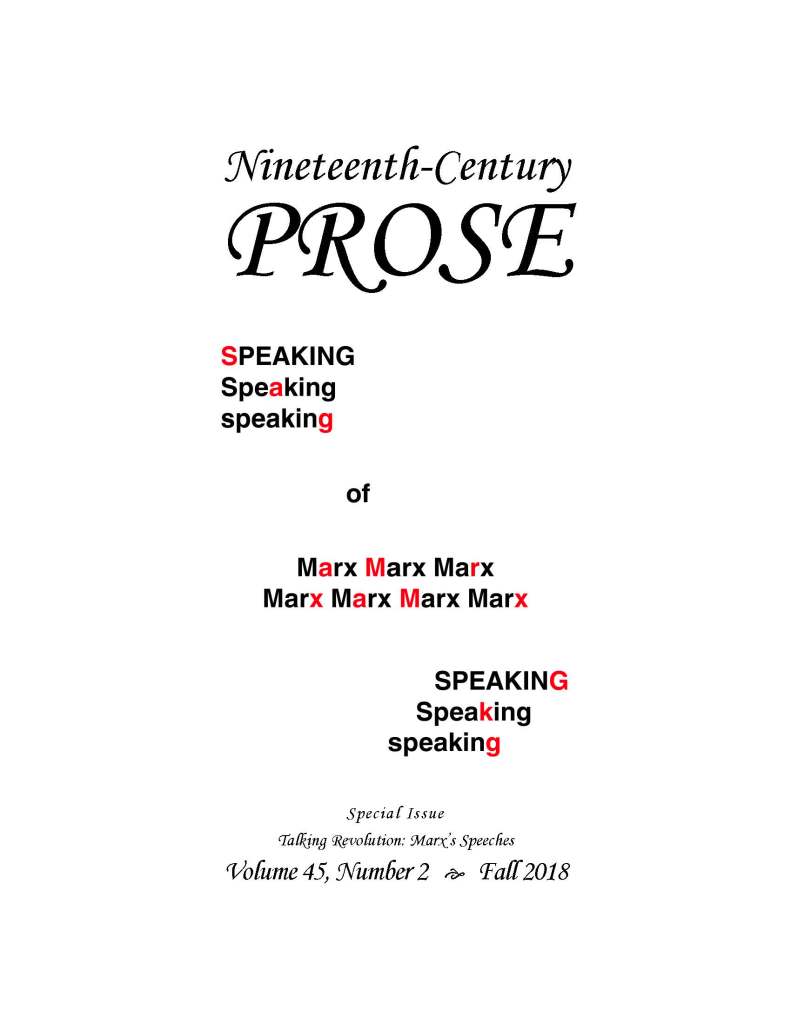Talking Revolution: Marx’s Speeches

Abstracts
Kimberly DeFazio and Rob Wilkie: “Introduction: Talking Revolution: Marx’s Speeches and the Speculative Communism” (1-68)
This special issue on “Marx’s Speeches” is an intervention into the dominant framework of “writing” that has underwritten the (post)humanities since the 1960s in the global North, in which the project of social transformation is reduced to a series of speculative interpretations and re-interpretations without end. Marx’s speeches, DeFazio and Wilkie argue, are not only about specific issues related to capitalism and the struggle of working people to transform it. They are also meta-texts on the historical conditions of language and consciousness and their dialectical connection to material relations. Marx’s speeches, in this regard, are “speecherly”: they are informed by and advance a materialist understanding of the relation of consciousness and the material world that also creates conditions for collectively changing material relations. Through a critical re-reading of the dominant articulations of writing and speech in contemporary cultural theory–from foundational critics such as Barthes, Derrida, Heidegger, and Foucault to the “speculative realism” of Harman, Barad, and Bennett – the Introduction argues that the materialist theory of the speecherly in Marx’s speeches makes theoretical thinking part of the everyday and thus turns the working class into revolutionary citizen-philosophers in the struggle for socialist transformation. The texts comprising the special issue are part of a project to return use-value to language and undo its appropriation by neoliberal capitalism by such concepts as “writing,” “writerly,” “reader-ly” […] and, of course, différant-ly.
Jennifer Cotter, “The Spectral Silence of différance, the Speech of Object-Oriented Exploitation” (69-116)
In “The Spectral Silence of différance, the Speech of Object-Oriented Exploitation,” Jennifer Cotter argues that Marx’s speeches in Wage- Labour and Capital produce concepts that break the silence on the relations of exploitation behind “exchange-value” and teach workers to see through the “language of the market” that obscures over the social causes of their exploitation in class relations. The dominant (post)humanities, however, teaches methods of analysis that render exploitation “unspeakable”and translate the language of the market into a new metaphysics by asserting that all “values” are underwritten by an originary “différance” (Derrida, Margins of Philosophy) or an ontology of irreducible things-in-themselves (Graham Harman, “The Road to Objects”). To intervene in the way the (post)humanities dismantles class- consciousness, it is particularly urgent to return to Marx’s speeches owing to the way they speak to the development of workers as collective agents of social transformation who understand that capitalism is not a law of nature but a socially and historically produced and therefore collectively transformable mode of production.
Amrohini Sahay, “Speaking Internationalism: Class Difference in the Writerly Cosmopolitics”(117-150)
Amrohini Sahay’s paper, “Speaking Internationalism: Class Difference in the Writerly Cosmopolitics,” offers a critical reading of Marx’s “First Address to the International Working Men’s Association” in relation to the institutionalization of what Roland Barthes calls the “writerly” in the cosmopolitical writings of Derrida and Latour. The writerly, Sahay argues, has worked to cancel the inside-outside binary, which (like all binaries) is not discursive but the cultural expression of a (material) two-tier economy, reducing the analysis of the relation of capital to labor to a Deleuzean immanent “intensity.” The immanent displaces the two-sided international class struggle – red internationalism – with cosmopolitanism as a post- class “ethics”–a deconstructive attentiveness to aporias of representation, or, more recently, a Latourian actor-network “irreductionism” that is a re- new-ing of the Deleuzean immanent for cognitive capitalism.
Bret Benjamin, “‘That single, unconscionable freedom’: Reflections on Marx’s ‘Speech on the Question of Free Trade’” (151-184)
Bret Benjamin’s essay,“‘That single, unconscionable freedom’: Reflections on Marx’s ‘Speech on the Question of Free Trade,’” places Marx’s 1848 “Speech on the Question of Free Trade” within the broader corpus of Marx’s writing. Benjamin argues, first, that the speech critiques bourgeois self-interest and celebrates worker acumen, fostering a proletarian standpoint of critique. Further, he reads the speech in line with Marx’s historical writings as an account of the transition to a fully-realized industrial capitalism, distinct from a prior period of monopoly protectionism. Third, he contends that the emerging category, relative surplus value, makes visible capital’s tendency to both absorb and displace labor. Finally, Benjamin argues that the speech posits a worker’s internationalism by viewing the plight of English workers in relation to the deprivations of weavers in India and slaves in the West Indies. The platitudes of free trade, then, mask the agonies of an ever-solidifying world market increasingly determined by the contradictions of the value-form.
Robert Faivre and Julie Torrant,“Emissaries of the Outside-Within” (185-230)
In “Emissaries of the Outside-Within,” Robert Faivre and Julie Torrant read Marx’s 1872 address at The Hague not only for its explicit political statement but for how the speech’s explanation and confirmation of the International’s decisions enact a historical materialist theory of language. Marx’s critique of the mimetic (“readerly”) theory of language provides a dialectical account from outside the bourgeois logic of the market and thus also produces the conceptual resources necessary to critique contemporary anti-mimetic (“writerly”) theories–from textualism to new materialism– which give the market logic of individualism an “ethical” update. In the speech, Marx develops an analytics of class solidarity that enables transformation because it grasps workers as the emissaries of the future: representatives of what has become materially possible given the development of the productive forces of labor but is blocked by the existing capitalist relations of production based onexploitation.
Stephen Tumino, “Speaking of Communism: How Badiou Subtracts Class from Marx’s Speeches on the Paris Commune to Produce a New (Infantile) Communism” (231-282)
Because of the crisis of global capitalism there is renewed public interest in Marx, Marxism, and Communism as workers around the world are beginning to fight back. In “Speaking of Communism: How Badiou Subtracts Class from Marx’s Speeches on the Paris Commune to Produce a New (Infantile) Communism,” Stephen Tumino argues that what will be of particular importance in the contemporary encounter with the intellectual and political legacy of Marx today is to engage with the speecherly theory of communism put forward in Marx’s speeches on the Paris Commune of 1871. Through a sustained analysis of them he explains how Marx’s critique of the infantile communism of the anarchists implicates the writerly communism dominant on the North Atlantic left today, as in the writings of the “new communists” (e.g., Badiou, Negri, and Zizek) who subtract class from communism so as to affirm an egalitarian idea of the “common.”
